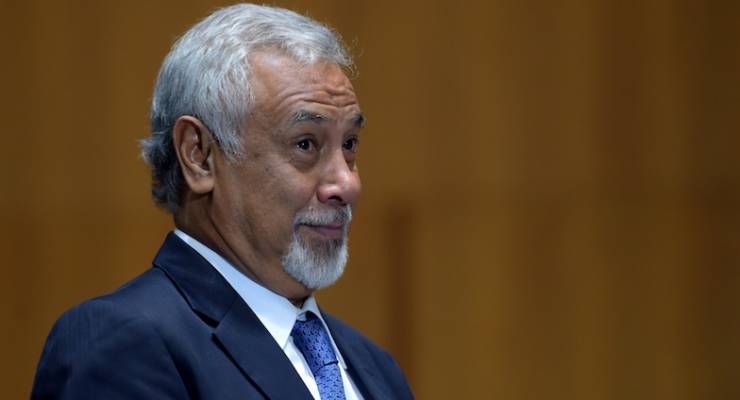
Timor-Leste’s coalition government has fractured, possibly fatally, marking a new low point in the 18-month leadership of Prime Minister José Maria Vasconcelos (known by his nom de guerre, Taur Matan Ruak). This raises the prospect of recession and months of political in-fighting.
On Friday, the largest party in the ruling three-party Alliance for Change and Progress (AMP), The National Congress for Timorese Reconstruction (CNRT), abstained from supporting the annual budget. Failure to pass the budget means Ruak, leader of the People’s Liberation Party (PLP), will be unable to enact new spending programs in a country heavily reliant on government stimulus.
The main opposition party, FRETILIN, voted against the bill that contained deep cuts to health, education and sanitation yet retained hundreds of millions of spending on the government’s controversial liquid natural gas processing infrastructure and unaccounted government transfers criticised by economists. The abstention by CNRT sealed the budget’s fate.
Under Timor’s so-called duodecimal system — implemented when an annual budget is not yet enacted — one 12th of the previous year’s budget is allocated for spending each month. The last times this system was in place, in 2017 and 2018, the country was plunged into recession.
In 2017, GDP shrunk by 3.5% and a further 0.2% the following year. In 2019, this bounced back to 4.5% growth once a budget was passed with government stimulus.
“This is certainly not business as usual,” Swinburne University international politics professor Michael Leach, a Timor-Leste expert, told Crikey. “There is now a situation where the largest party in a ruling alliance has failed to support its own government’s budget. This has forced Timor-Leste back onto the reserve budget system which could cause economic contraction and won’t be popular. Something has to give.”
Ruak, a former resistance leader who served as the country’s president from 2012-2017, has been under pressure for failing to secure endorsement from Timor-Leste President Francisco ‘Lu’Olo’ Guterres for the nine CNRT ministerial nominees backed by CNRT president Xanana Gusmão.
This has left a range of portfolios being run by acting ministers from the smaller parties in the AMP coalition — PLP and Kmanek Haburas Unidade Nasional Timor Oan (KHUNTO).
This situation has created tensions inside the AMP coalition because the CNRT has lost control of considerable budget allocations, tilting operational power in the government away from the majority party.
The Timor-Leste Constitution states that a bill cannot be re-presented to parliament in the same sitting session. Some government insiders in Dili are saying this means it won’t be voted on again until September. There is some debate, however, about whether the budget bill should be treated as other bills. Whatever the case, the situation is unlikely to be resolved any time soon.
The move to allow the budget bill to fail is widely seen as a power play by Gusmão — the nation’s feted revolutionary hero and still its most powerful politician. He has served as president (2002-2007), and prime minister (2007-2015).
Gusmão and Ruak, once brothers in arms, had fallen out while the latter was president but reconciled ahead of the last election when PLP switched its support from FRETILIN to CNRT. It now seems the relationship is once again problematic and many speculate that Gusmão is planning to oust Ruak.
The 2020 budget process has been both controversial and convoluted. After several months of consulting with all parties as well as the public, the PM presented a budget for US$1.95 billion (A$2.83 billion). The outcry against this was widespread and included a report from the parliamentary budget review committee that that budget could be unconstitutional. This led to a second budget bill of $1.6 billion that failed to be passed last week.
Apart from significant foreign aid, with Australia the biggest donor, the Timor-Leste government relies almost exclusively for funding on its sovereign wealth Timor-Leste Petroleum Fund. That is now worth about $16 billion and has been funded with royalties from the Bayan-Udan project in the Timor Sea between the tiny nation and Australia.
But this revenue flow is finite and the reserves are forecast to be exhausted by 2023. After a UN court ripped up a maritime border treaty with Australia in 2018 after it deemed it inequitable, the CNRT’s remedy formulated by Gusmão was to spend $650 million to buy out foreign partners ConocoPhillips and Shell in another, bigger untapped reserve known as Greater Sunrise.
The next step is a controversial project of liquid natural gas-related capital works on the country’s remote south coast, collectively know as the Tasi Mane project. This could cost as much as $12 billion, and includes an undersea pipeline across a dangerously deep undersea trench.
Guterres, who is understood to already have been having informal discussions with all political parties prior to the budget bill failure, has little power to intervene unless Ruak resigns — something government sources said he is not intending to do.
If that happens, the president can call an election or ask the parliament to vote in another government after consulting with all parties.
The option of a government of national unity — a mechanism that has worked to solve previous deadlocks — that was being considered now looks to be dead, with FRETILIN now keen to sit this out. Gusmão may even return as PM or appoint another CNRT leader. Whatever the case, the people of Timor-Leste continue to be ill-served by their ageing independence leaders.








Crikey is committed to hosting lively discussions. Help us keep the conversation useful, interesting and welcoming. We aim to publish comments quickly in the interest of promoting robust conversation, but we’re a small team and we deploy filters to protect against legal risk. Occasionally your comment may be held up while we review, but we’re working as fast as we can to keep the conversation rolling.
The Crikey comment section is members-only content. Please subscribe to leave a comment.
The Crikey comment section is members-only content. Please login to leave a comment.